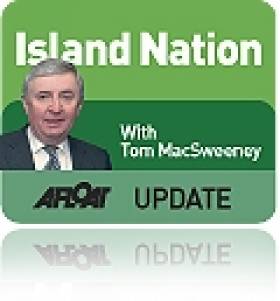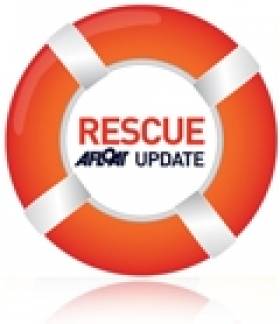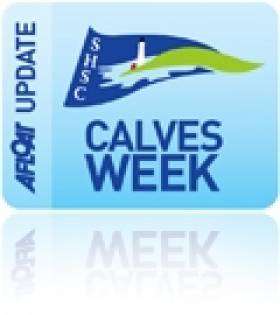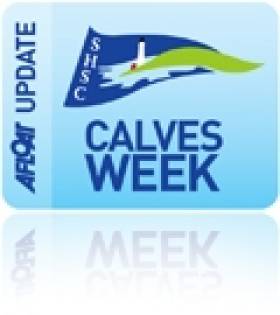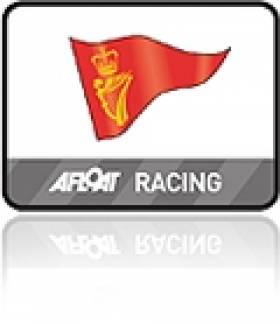Displaying items by tag: west cork
Spinnaker on Top in Team Racing National Championships
Last weekend's The Irish Team Racing Association National Team Racing Championships attracted it's largest entry for many years, with 21 teams registered.
The event was hosted by the Fastnet Marine and Outdoor Education Centre in Schull, West Cork.
Four teams travelled over from the UK, and 6 under 19 teams, all from County Cork, competed. They joined the keenest of the post-college teams and the leading university teams to constitute the largest Championships that Ireland has seen for many years. Schull, the venue for next year's World Championship, was a major attraction, but the change of date, from March to November, has made it easier for college students and school pupils to attend.

Weekend Team Racing action from Schull. More photos HERE. Photos: Brian Carlin
The weather forecasts had been predicting storms, floods and general mayhem for days if not weeks beforehand. But Saturday dawned to reveal Schull Harbour in an unusual state – the wind had disappeared! Racing started 3 hours later than planned. However, by the end of the day the first round had been completed. This was a seeded round robin, with each of the four League made up of a UK team, a leading Irish team, a leading college team and two others, including the youth teams.
The results of the first round determined entry into the second round – all the UK teams won all four leagues, with the George Knights, the George Gladiators, Supertroopers and UCD finishing second. These teams were joined in the Gold Leagues of the second round by the winners of play-offs between third place teams. The Bumsby Babes, a youth team from Royal Cork YC, had done well to win 2 races to qualify for a play-off against University of Limerick and they were in a strong position when equipment failure meant that one of their boats retired . In the subsequent re-sail UL managed to win the race and qualify.
On Sunday morning Schull was looking it's best in bright but cold sunshine. Unfortunately, the beauties of the West Cork landscape were exactly mirrored in the unruffled water of the harbour! Competitors, who had made a remarkable effort to arrive on time for an 0900 start, barely recovered from the reception organised the previous evening by the World Championship Committee, waited. When racing eventually got underway, in a fitful breeze, it quickly became obvious that there was no possibility of finishing the second round. Plan B was implemented, a knockout round between the four winners of Round One to determine the outright winner, another between the 4 Irish team placed second in the Round One Leagues to determine the ISA medal places and a Youth round.
GP14 World Champion Ian Dobson in Schull
Spinnaker came through the semis and final to win overall first place. The two Royal St George teams qualified for the final. Last year's winners, the Gladiators won the first race only after finishing places were confirmed by a redress hearing. However, the more experienced Knights went on to win the next to races to reclaim the trophy they had "lent" to the Gladiators last year. The third place play-off, which saw some of the noisiest races of the weekend, resulted in a win by Supertroopers over UCD.
In the Youth event Schull A beat Schull B to win the opportunity to take on, and eventually defeat the Bumsby Babes.
Next year's Championship will be sailed out of the Royal St. George on 12-13 November. However the next challenge for Irish team racers will be qualification for the World Championship, with selection trials planned for both the Youth and Open categories early in 2011.
The event was also the first opportunity to try the new TR3.6 which will be used for the Team Racing Worlds. Video below of the new TR3.6 and voice over from Team Racing World organiser David Harte in Schull. Stills by Brian Carlin HERE.
David Harte Sets Another Headline
I have long admired the commitment and dedication to sailing of David Harte in Schull. With his design of the TR 3.6 he has achieved what may well prove to be the ideal boat for team racing. This aspect of sailing is proving very popular amongst younger sailors. In the past few months I have been watching and reporting on the development of the sport by Match Racing Ireland which is now an integral part of the Irish Sailing Association. There is an excitement and enthusiasm which is good for the sport.
Now Schull and David Harte are adding a new dimension with the TR 3.6 which seems a bit like a Firefly when you look at it first, but then there are clear differences in design. The 3.6, a two-person dinghy, is just that in length. "It is robust, cheap to produce and the first boat customised for team racing. This is a boat for people who don't own a boat. It is a boat made for a situation where different crews will be using it and it has to be able to stand up to that pressure. I looked at the concept of the Firefly and then adapted it to what will prove to be a good boat for team racing," David told me.
The boat was shown for the first time at the announcement that Schull will host the ISAF Team Racing World Championships which will be held in the West Cork harbour in 2011. Twenty-four teams from around the world will compete, with the Fastnet Outdoor Education Centre as the base. It has a proven record of success in teaching sailing as a curricular subject at the adjacent Schull Community College which, through the foresight of the Cork County Vocational Education Committee, established this approach several years ago.
David Harte manages the operation. The success of the Schull students in winning the British championships this year, as well as their progress in the sport elsewhere after they leave the college is a testimony to his success.
Next weekend the Irish Team Racing Championships will be held in Schull, with 18 teams from around the country competing "and 40 per cent of the helms will come from Schull," David told me with a satisfied smile, which he deserves to have.
It is intended to raise funding for a fleet of 25 new TR 3.6 boats which Schull will provide for the world championships. Afterwards the boats will remain there, providing more years of sailing for young people. A sponsorship project has been launched and already seven boats have been funded. It is intended to build the boats in Cork and to have the sails made there. The world championships are scheduled to start on Saturday, August 27, 2011.
Photos of the new design afloat HERE
• This article is reprinted by permission of the EVENING ECHO newspaper, Cork, where Tom MacSweeney writes maritime columns twice weekly. Evening Echo website: www.eecho.ie
Three Die in Cruiser Fire off West Cork
Three men are dead and a fourth has been injured after a boat went on fire and sank off the West Cork coast this evening. It happened in waters south of Roundcarrig Lighthouse off Adrigole Harbour, Bantry Bay. It is understood a serious fire broke out on the 25-foot cruiser. The RNLI lifeboat went to the cruiser's rescue at 5.45pm. There is no information currently about the type of cruiser involved.
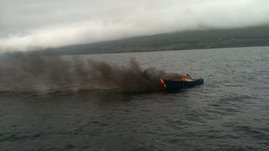
Photo: courtesy of Castletownbere lifeboat
A Coast Guard helicopter spotted the men in the water. The boat was on fire and sinking as they arrived.
The bodies of the three victims have been removed to hospital. It is understood all four men, who were in their 60s, were living in the Glengarriff area.
One of the victims is Irish and the other two men are from other European countries. A fourth man, who survived the incident, has also been taken to hospital.
The boat sank a short while later off Roancarrig, about seven miles from the fishing port. Conditions were calm at the time with some light fog in the bay, the spokeswoman said. Officials from the Marine Casualty Investigation Board will carry out an inquiry into the incident.
It is understood investigations will centre on whether an explosion in the engine caused the fire.
Press Release from RNLI:
Lifeboat crew with Castletownbere RNLI responded to a callout out this evening (Monday 16 August 2010) to a 25-foot cruiser on fire seven miles off the coast of Castletownbere, off Adrigole Harbour in Bantry Bay. The Shannon based Coast Guard helicopter was on scene and recovered four casualties from the water. Three were pronounced dead and one was taken to Cork University hospital for treatment.The Castletownbere all weather lifeboat was requested to launch at 17.41 hrs in calm conditions. On arrival at the scene the lifeboat volunteers witnessed the vessel on fire and the CG helicopter was recovering the casualties from the water. The Shannon based helicopter had been out on a callout and was in the area. The lifeboat was designated on scene commander and stayed on scene until the burning cruiser sank.
Spinnaker Run to Calves Week
The race continued to Schull where Donal O'Learys 'D Tox' took line honours finishing shortly after 7am. With numerous requests for redress, the race committee had a busy time sorting Class One results, which resulted in 'D Tox' taking first in both IRC and Echo, with Exhale and Saxon Senator filling second and third.
The spoils were shared in Class Two With Kieran O Briens 'Magnet' taking the IRC trophy, with the Barrett/Conlon team in 'Y Knot' winning Echo.
In the combined Classes Three and Four dogged determination finally paid off for Eddie Higgins and the crew of La Maraquita who, sailing the smallest boat in the race, crossed the Schull line in an elapsed time of sixteen and a half hours to capture the Echo trophy, with David Kenefick's 'Tiger' winning IRC.
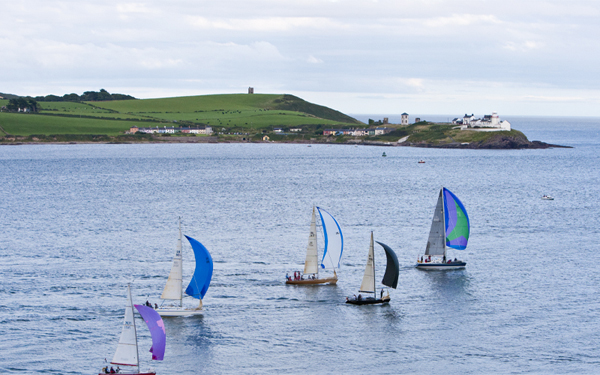
West Cork bound. Photo: Robert Bateman
Compared with their companions from the previous night, the five White Sail boats that started from Kinsale on Saturday morning had an uneventful long slog to Schull where Bryan Heffernans 'Aisling' took first ahead of Doherty and Co in 'Free Spirit' and Julian Dockery's 'Flying Fish',while Kieran Dwyer's 'Brazen Huzzie' was the sole finisher in White Sail Two.
On Sunday the Wind Gods totally deserted Schull, where Race Officer Neill Prendeville was finally forced to fly the abandonment flag after a four hour postponement.
1720s make Calves Week Comeback
With over 60 confirmed entries at present, the 2010 Calves Week in Schull is expected to top the 80 boat mark for the annual West Cork festival of sailing. The week long sailing event is once again supported by the local business community together with sponsorship from Saab, Airtech Security and A&L Castors.
This year’s event will feature racing for eight cruiser classes, together with the growing West Cork 1720 fleet of sportsboats
Due to the dramatic increase in numbers, the White Sail fleet will be split into two, with a cut off point of approximately 35ft. Both fleets will begin the series in Kinsale, where they will start a daylight race to Schull at 8am on Saturday morning July 31st.
The cruiser fleets in Classes Zero, 1 and 2 will start the traditional Crosshaven/ Fastnet/Schull overnight race at an earlier time of 19.30 on Friday 30th from the Weavers Point line, while Classes 3 and 4 will sail a shorter course direct to Schull.
The opening reception and briefing has been moved from the event headquarters at the Fastnet Marine Centre to the Harbour View Hotel in Schull and will take place at 8.00 pm on Saturday 31st, and this venue will also host the final overall presentation of prizes on Sunday August 8th.
The first race from Schull will start on Sunday 1st August when the fleets will sail a variety of courses which will all finish in Baltimore in the late afternoon. Some of the boats will stay overnight for Monday’s regatta with the full fleet again resuming for battle in Schull on Tuesday morning where a costal race is scheduled.
On Wednesday the fleet will sail to Cape Clere Island for the fun regatta of the week. The racing boats will anchor in South Harbour while the support craft will tie up in North Harbour. This infamous event is run by the secret committee of the Cape Clere Yachting Association and has always proved to be the ideal location for the crews to “leave their hair down”
On Thursday the racing returns to Schull with a mid week presentation of trophies in the Courtyard on main street, while on Friday the fleet will round the Fastnet Rock with a finish in Crookhaven, where some of the boats remain overnight for the following days regatta.
The exhausting week will finally conclude on Sunday August 8th with Schull Regatta where racing will take place on a variety of courses in Roaring Water Bay, with the closing ceremony and overall presentation of trophies at 8.00 pm at the Harbour View Hotel.
Royal Cork Boats were well represented today (Sun) at Glandore Harbour Yacht Club At Home writes Claire Bateman. Mediterranean conditions prevailed with sun, wind and sparkling blue water. When conditions such as existed today prevail this is a little piece of paradise tucked away in West Cork surrounded by glorious scenery. It was apt that they were rewarded with these conditions for the celebration of their 25th anniversary. The mouth of the harbour is marked by the Adam and Eve Islands and the cruisers had a start south east of this point using Neil Prendeville's Mary P as committee boat and a race officer team that included event organiser Cormac O'Carroll. The 16 knot breeze outside the harbour was from the south west, while inside the harbour there was a lighter breeze that one would guess was more from the north west and this was where the Squibs were sailing their two day championship.
The club is a hive of activity in furthering its amenities and they are very actively raising funds for a new club house. They had a raffle for a new car on offer today to further this project. Also they had a novel event of a Pig Roast-Barbeque with great music by the Roaring Forties and were looking forward to a great night of entertainment.



























